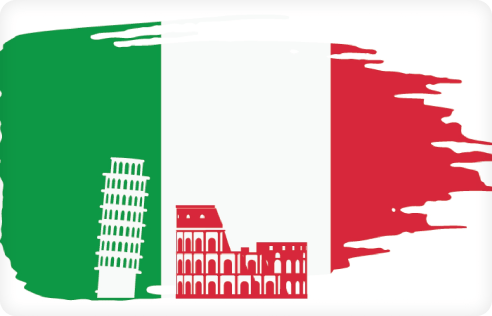Italian
All European languages follow the CEFR, Common European Framework of References for languages. The CEFR organizes language proficiency in six levels, A1 to C2. Currently we offer each level from A1 to B2. If you are looking for a higher level, please write to us with your specific requirements.

We recommend A1 if you are just exploring the language.

We recommend a B2 or C1 if you are looking to teach or secure a job in which the language will be your primary mode of communication.

Italian
This course includes:

A1 - B2
4 Levels

Course duration
100-700hours

Course Material
Study pack
Access to Online Resources
Why Italian?
1. Work in a Global Environment
- Many multinational companies in the fields of luxury goods, design, apparel, automobiles, and IT offer services to Italy and other Italian-speaking parts of Europe such as Switzerland and Albania.
- Several fashion and design schools and universities are actively seeking Italian language teachers.
2. Education in Italy
- Italy offers a wide range of educational verticals, including commerce, culinary arts, interior design, fashion, robotics, shipbuilding, aerospace engineering, and tourism.
- Most of these courses are taught in Italian, making a minimum B2 level of proficiency beneficial for admission to Italian universities.
3. Explore Ancient and Medieval History, Art & Culture
- Italian is an ancient and historic language deeply intertwined with European history. Having knowledge of Italian is highly advantageous for connecting with and appreciating Italian art and culture. Italy is renowned for its opera, paintings, sculptures, architectural marvels, and music and films.
- It has been home to various influential thinkers and writers, including Dante, Petrarch, Machiavelli, and Michelangelo.
4. Gastronomy
- Famous universities like Cordon Bleu make Italy a popular choice for those interested in food sciences. Knowing the language provides a stronger connection with the Italian community and people.
- As one of the leaders in the culinary industry, learning Italian can improve your chances of placements in hotels, cruises, and other tourist industries.
To know the fee for this course, click here.
Other Courses you might like

5 Levels
German
Learn German to explore opportunities in Germany, a leader in innovation, and a strong economy.

5 Levels
French
Embrace the language of romance, known for its cultural influence, and international diplomacy.

5 Levels
Spanish
Learning Spanish opens doors to diverse cultures, travel destinations, and job opportunities.
Italian A1
Italian A2
Italian B1
Italian B2
Oral Communcations
- Greeting formally and informally
- Taking leave
- Asking people their names
- Expressing thanks and gratitude
- Saying where you are from and what you do
- Telling people your age
- Introducing yourself and others
- Giving and asking for phone numbers
- Asking for repetition
- Ordering food and drink in a restaurant and asking for the bill
- Talking about existence
- Expressing likes and dislikes
- Telling the days of the week, months and seasons
- Telling time
- Talking about free time and leisure activities
- Describing places (a room, a flat, a home…)
- Talking about the area you live in
- Making a hotel reservation and asking details about the room
- Locating objects
- Asking for and giving directions
- Writing brief messages
- Talking about common daily routines
- Talking about the weather
- Talking about travels and holidays
- Talking about past events
- Expressing best wishes
- Expressing possession
- Talking about family
Grammar
- The alphabet
- Subject pronouns
- Present tense
- Definite articles
- Adjectives of nationality
- Interrogative words
- Numbers
- Regular verbs
- Nouns
- Negative sentences
- Indefinite articles
- Demonstrative adjectives
- Simple prepositions
- Adverbs
- Present tense of piacere (to like, to be pleasing)
- Anche (also, too) and neanche (neither, nor)
- C’è (there is) and ci sono (there are)
- Prepositions of time
- Combined prepositions
- Ordinal numbers
- Dates
- Particle “ci” and the verb “andare”
- Adjectives
- Molto (adverb vs. adjective)
- The passato prossimo (Present Perfect / Simple Past)
- Regular and irregular past participles
- Absolute superlative
- Negative structures
- Use of qualche (some)
- Reflexive verbs
- Time expressions
- Idioms with the verb fare
- Possessive adjectives
- Articles and possessive adjectives
- Relative superlatives
- Reflexive verbs in the passato prossimo
Socio-Cultural Aspects
- Greetings in Italy
- Formality related to age and social status
- Professions and titles
- Food and drink. Typical dishes
- Meal times
- Public streets
- Working hours
- Housing conditions
- Free time activities
- Public holidays
- Family structures and relations
Oral Communcations
- Requesting someone to do something
- Expressing possibility
Grammar
- Expressions of quantity
- Partitives
- Direct pronouns
- Impersonal constructions
- Unstressed and stressed indirect pronouns
- Demonstrative adjectives and pronouns
- The informal imperative
- Comparatives
- Past tenses (II): The imperfetto (form and use)
- Imperfetto vs. passato prossimo
- Time expressions with the passato prossimo and imperfetto
- The particle ci
- Negative structures
- The verbs cominciare and finire in the passato prossimo
- Present conditional: form and use
- Indefinite pronouns
- Progressive constructions: stare + gerund
- Direct and indirect pronouns with the infinitive
- Relative pronouns
- The verb volere in the imperfetto
- The verbs sapere and conoscere in the passato prossimo and the imperfetto
- Imperfetto vs. passato prossimo
- The verb servire
- The formal imperative
- Position of pronouns with the imperative
- Comparatives and superlatives
Socio-Cultural Aspects
- Common gestures
- Public life
- Italian food
- The Italians and their pets
- The meaning of colours and the Italian culture
- Free time activities
- Contemporary culture: Italian artists
- Regions in Italy: Tuscany
- Holidays and preferred destinations
- Festivals and traditions
- Sports: football in Italy
Oral Communcations
- Talking about the future
- Making plans and expressing intentions
- Apologising and excusing
- Forbidding someone to/ from doing something
- Narrating experiences
- Expressing interest
- Expressing disappointment
- Expressing doubts
- Expressing hopes
- Expressing opinions
- Seeking someone else’s opinion
- Expressing agreement and disagreement
- Giving reasons
- Asking for assistance
- Indicating preferences
- Expressing relief
- Expressing regret
- Comparing
- Calling someone on the phone
- Complaining
- Talking about cultural differences
- Reporting what somebody has said
Grammar
- Future tense: the futuro semplice
- Impersonal constructions: bisogna + infinitive
- The verb metterci
- Conditional clauses
- Pronouns: la / le
- Mentre + verb vs. durante + noun
- Immediate future: stare per + infinitive
- Past tenses: modal verbs in the passato prossimo
- Conjunctions: però, quindi, perché, mentre and quando
- Adjectives: bello
- Present subjunctive
- Uses of present subjunctive
- Comparatives: più… di / che
- Adverbs: magari
- The trapassato prossimo (past perfect)
- Uses of dovere
- Combined pronouns
- Negative prefixes: in-
- Past conditional
- The particles ci and ne
- Pronominal verbs: tenerci, spuntarla and piantarla
- Possessive pronouns
- Past subjunctive
- Revision on the subjunctive
- Agreement of tenses and moods
- Suffixes: -accio
- Conjunctions: a patto che, a condizione che and purché
- Adverbs in -mente
Socio-Cultural Aspects
- The world of work: the CV
- Social relations
- Family life
- Buying a house in Italy
- Italian Cities: Venice
- English loanwords
- The Italian language in the world
- The “italophony”
- Famous cities in Italy
- Italian brands
- Being Italian: stereotypes
- Expats in Italy
Oral Communcations
- Describing the plot of a book
- Expressing interest or a lack of interest
- Making suggestions
- Expressing opinions
- Asking for and giving confirmation
- Expressing consequence
- Giving advantages and disadvantages
- Interrupting
- Describing a trip
- Reviewing films
- Formulating hypotheses
- Expressing disagreement
- Talking about a past event
- Reporting what someone else said
- Relating an historical fact
- Asking for clarification
- Talking about your learning process
- Explaining the results of a study
- Interpreting tables and graphs
- Using humour and irony
- Describing people, places and objects in detail
- Presenting yourself clearly
- Relating events in a film
- Talking about your school/ college days
- Expressing regret
- Defending arguments and ideas
- Discussing environmental issues
- Talking about cultural events
- Describing an image in detail
- Carrying out an interview
- Being interviewed
- Giving and responding to instructions
- Complimenting and praising
Grammar
- Imperfect subjunctive
- Come se + subjunctive
- Indirect speech
- Agreement of tenses and moods
- Passive voice
- The passato remoto (historical past)
- Present tense expressing past events: The presente storico
- Reflexives verbs in impersonal constructions: ci si
- Past conditional: the future of the past
- Conditional clauses (II)
- Impersonal constructions (II)
- Position of pronouns with the gerund
- Indirect questions
- Indirect speech with main clauses in the past
- The structures prima che vs. prima di
- Passive voice with the verb andare
- The congiuntivo trapassato (pluperfect subjunctive)
- Conditional clauses (III)
- Progressive constructions: the gerundio passato (having arrived)
- The structure dopo + infinito passato (past infinitive)
- Pronominal verbs: cavarsela e entrarci
- Review of past tenses in the indicative mood
- Relative pronouns: chi (the one who) and ciò che (what)
- The futuro anteriore (future perfect)
- Indefinite words with the subjunctive
- Review and extension of passive voice
- Verbs with prepositions
- Review and extension of indirect speech
- Use of subjunctive in relative constructions
- Use of subjunctive with the superlative
- Finalmente vs. alla fine
- Using the gerund to express a hypothesis or a causal meaning
- Antonyms (nouns and adjectives)
- Replacing se in conditional clauses
- Review and extension of conditional clauses
- Negative main clauses + subjunctive
- Purché + subjunctive
- Infinitive as nouns
- Review and extension of relative pronouns
- Position of pronouns with the gerund, past participle, infinitive and imperative
- Position of adjectives: review and extension
- Review and extension of present and past gerund
- Homonyms
- Colloquial expressions
Socio-Cultural Aspects
- Italian writers
- Reading habits
- The family in Italy
- Addressing people
- Festivals and traditions
- Italians in history
- Regions: Marche
- Stereotypes
- Leopardi
- The Italian school
- Italian cuisine
- Mass media
- The world of work
- Italian cinema
- Italian art. Museums.
- Paintings
- Sustainability
- Geograph
Upcoming classes in the month of July
No results found.